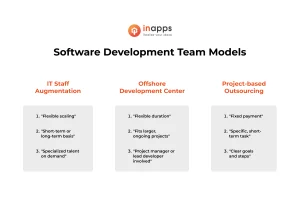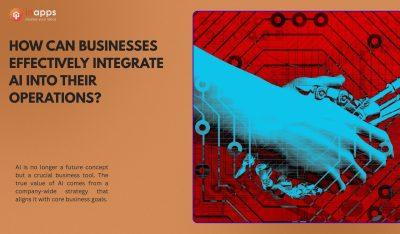- Home
- >
- Offshore News
- >
- Ultimate Guide To Hire A Software Development Team
In recent years, the demand for software development teams has surged, with 64% of companies now outsourcing to meet their tech needs. The key to success lies not just in hiring any team, but in finding the right one that aligns with your project’s vision and goals.
This blog is your ultimate guide to hire a software development team. From uncovering where to find top-notch developers to choosing the most suitable software development team model, we cover it all. We’ll guide you through hiring the right people, setting up an offshore development center, defining your project needs and budget, and ensuring successful collaboration. Plus, we’ll share insights on fostering a high-performing and innovative team equipped with the necessary tools for excellence.
By the end, you’ll know how to hire a software development team that not only meets your expectations but exceeds them, ensuring your project’s success from the get-go.
1. Where to Find a Dedicated Development Team
Finding the right dedicated development team for your project can feel overwhelming, but it doesn’t have to be. Here are the top locations to hire a software development team.

1.1 Software Outsourcing Companies
These software outsourcing companies specialize in providing development teams for projects just like yours. They manage the hiring process, ensuring you get a team with the right skills and experience. For instance, if you need a team experienced in blockchain technology, software outsourcing companies can connect you with professionals who are experts in that area.
1.2 Online Job Platforms
Next, online job platforms like LinkedIn, Indeed, and Glassdoor are excellent resources. You can post your project requirements here to attract professional developers. Say something like, “Looking to hire a dedicated development team for a fintech project,” specifying the skills and experience needed.
1.3 Tech forums and communities
Tech forums and communities such as GitHub or Stack Overflow are also valuable. These places are where engaged developers share their work and discuss new technologies. You can find someone fitting your project’s needs by posting your requirements or searching the forums with phrases like “looking to hire a team of developers for a short-term project.”
1.4 Freelance websites
Freelance websites like Upwork or Toptal are another route to hire a development team. These platforms give you access to a global pool of talent, allowing you to review profiles, past project examples, and ratings before reaching out to potential candidates. It’s a direct way to connect with skilled individuals who can become part of your dedicated team.
When aiming to hire a software development team, remember to clearly outline your project’s requirements, budget, and the specific skills you’re looking for. The more specific you are in your job postings and communications, the better. For example, specifying “need a mobile app developer experienced with React Native for a 3-month project” will attract more suitable candidates than a vague description.
2. Choosing the Right Software Development Team Model
In software development outsourcing, we mainly see 3 models: Project-based outsourcing, Offshore Development Center (ODC), and IT Staff Augmentation. Knowing which one to choose is important for a successful outsourcing experience.
Project-based outsourcing
For those looking to hire a software development team for a specific, short-term task, the Project-based model is often the best fit. The Project-based model is about hiring an overseas developer or team for a specific, short-term project. This model is good when you know exactly what you need and how long it should take. The payment is usually a fixed amount. This is best for projects that have clear goals and steps, or for startups wanting to create a basic version of their product quickly.
Offshore Development Center
On the other hand, the Offshore Development Center (ODC) model is chosen by companies that don’t have their own software developers. In this model, businesses hire a software development team on a more flexible basis, which could be either short-term or long-term.. The company looking to hire brings on a project manager or a lead developer to make sure everything goes smoothly. This model fits well with larger, ongoing projects that might need changes along the way.
IT Staff Augmentation
With IT Staff Augmentation, you can bring in specialized talent on a short-term or long-term basis to complement your existing team. This approach is flexible, allowing you to scale your team up or down based on project demands without the long-term commitment of hiring new full-time employees. It’s ideal for projects where you need extra hands or specific skills that your current team might not possess.
Learn more: Diving into ODC vs IT Staff Augmentation: 11 Key Distinctions Unveiled
So, when choosing the best outsourcing model for your project, consider the nature and needs of your project. If you have a one-time project with clear requirements, go for the Project-based model. For ongoing projects needing flexible changes, the Offshore Development Center (ODC) might be more suitable. And if you need to temporarily expand your team’s capacity or skills, IT Staff Augmentation offers an effective solution.
3. How to Hire the Right Software Development Team
Hiring is challenging, especially when it comes to finding the right software development team remotely. You have to rely on CVs and a few online interviews, but certain qualities can hint at a candidate’s potential for greatness.
What to Look for in a Software Developer?
- Team Players: Gone are the days when software developers could just code in isolation. Nowadays, it’s crucial to hire a software development team that excels in both coding and communication. Success hinges on the team’s ability to communicate effectively and work harmoniously. Look for those who share stories of teamwork, how they handle differences, and value everyone’s contributions. You want people committed to the team’s success, not just their own.
- Proactivity: The best software engineers are those who don’t just wait for tasks. They’re drawn to your company by exciting, challenging projects, not just the pay. They’re the ones who suggest ideas and ask questions, and even if their suggestions aren’t always perfect, they inspire others. These proactive spirits are essential for your dedicated software development team.
- Responsibility: The term “responsible” might seem overused on CVs, yet it’s a critical attribute. Find out how candidates organize their work, prioritize tasks, and handle unexpected issues. This can give you insight into whether they truly embody this trait.
- Willingness to Learn: Ideal team members are those eager to learn and step outside their comfort zones. They’re open to tackling new challenges and enhancing their skills. Ask how they’d feel about temporarily taking on different responsibilities. Be cautious of those who are reluctant to expand their roles without extra compensation, as this can lead to ongoing disputes about responsibilities and pay.
When you aim to hire a development team or a dedicated development team, focus on finding individuals who are not just technically skilled but also excel in communication, initiative, responsibility, and a willingness to learn and grow. These qualities are key to building a team that will drive your project to success.
4. Step-by-step guide to hiring a software development team
If you’re looking to hire a software development team for your startup, it’s crucial to start with a solid plan.
4.1. Define your Needs and Goals
The first step might seem obvious, yet it’s often overlooked. Ask yourself important questions: What kind of app are you aiming to build? Which technical skills are essential for your developers? How quickly do you need to market, and what are your quality benchmarks? Detailing everything from the necessary infrastructure, and testing protocols, to your budget and plans for unexpected costs, is vital. This step ensures that you have a solid foundation, making it easier to find a team that matches your specific requirements.
For instance, if your project is a fitness app, you’d seek developers experienced in GPS tracking and secure payment integrations, highlighting the importance of specificity in your planning phase. Remember, as you outline your requirements, setting priorities is key. Not every aspect of your project will have the same importance. This prioritization will be your compass when you hire a software development team.
4.2. Define Roles and Responsibilities in Your Remote Software Development Team
Clearly outlined software development team roles and responsibilities are the key to success in any software project. A project’s software development team structure depends on your needs. One project may require mobile app developers only, while another one — a full cross-functional software development team.
What is the ideal team size?
A typical productive software developer team consists of 5–7 people. This size allows every team member to be fully immersed in project details and understand the scope, challenges, and possible solutions. If the team is larger than 7 people, you’ll need to establish guidelines, workflows, and be always hands-on in coordinating the overpopulated group. Or you can hire someone to coordinate it instead of you.
Software Development Team Structure

How to build a successful software development team
- Software Engineers
The heart of your project. You might start with one full-stack engineer who can handle both front-end and back-end tasks. But as your project grows, consider adding a few senior engineers. Their experience doesn’t come cheap, but their ability to foresee and navigate challenges is invaluable. They’re adept at adapting to new technologies, meaning if your project needs to switch from using Angular to React, for example, they can do so smoothly.
- QA Engineer
This role is crucial for catching bugs early and ensuring your product works flawlessly before it reaches the public. They’re the guardians of your product’s quality, making sure it meets all the requirements.
- Project Manager
The Project Manager is responsible for keeping the project on track, managing budgets, and ensuring everyone is moving towards the same goal. If hiring a dedicated project manager is out of reach, consider enhancing your own management skills. It’s about steering the ship in the right direction and keeping the team focused.
If you cannot afford or find a great project manager when you hire a software development team, you have to become one. Consider developing your own project management skills by passing relevant training or at least consulting project managers or line managers you know.
- Scrum Master
The Scrum Master’s role is not only to implement Agile principles and ensure they’re followed by the software development team, and the client. This way, they don’t interrupt sprints with unexpectedly added features, etc. If there are any changes to be implemented, they should be addressed to the Product Owner and added to the Product Backlog. If there are no other agreements set. In many teams, project managers double as Scrum masters.
- Product Owner
A Product Owner performs the role of the Voice of the Business and translates the goals set by a business stakeholder to the software development team. To put it simply, the Product Owner makes sure that the team builds the right product. This person is responsible for the execution of the tasks in the backlog and for planning the scope of work.
- Team Lead
A Team Lead is responsible for the technical delivery of the project. Usually, the lead is also an active member of the development team, so they know the technical needs of the project well.
Remember that a Team Lead and a Project Manager are not the same person. A Project Manager’s overall responsibility is to make sure the project is wisely planned and that the team is performing at their best. A Team Leader is responsible for the daily responsibilities and efforts of the technical team and ensures the availability of all the resources needed for a project.
A Team Lead is vital for every technical team. The more teams — the more Team Leads. To become a Team Lead, a software engineer needs to be a good specialist and, what’s even more crucial, know how to lead people and take care of their needs.
- Chief Architect
Whether you need or don’t need to hire a Chief Architect depends on product complexity and the skills you have within your current engineering organization. If you have a complex company structure with a number of departments consisting of many development squads, you may need a person who can coordinate the workflow between these squads. When your technology challenges begin to grow beyond your current team’s capabilities or the technical changes are becoming very complex, then consider hỉirng a Chief Architect when you hire a software development team.
- Business Analyst
The core job function of a Business Analyst is gathering requirements and understanding the scope of the project, the client’s needs, and pain points. A detailed business analysis includes outlining problems, opportunities, and solutions for business, as well as planning, budgeting, and reporting.
- UI/UX Designer
User Experience and User Interface Designers will help you measure and optimize the usability of your web applications for end users. They create the best user experience by exploring many different approaches to solve end users’ problems.
Each role, from software engineers to UI/UX designers, contributes to a balanced team capable of handling the project’s demands. Remember, the ideal team size can self-manage and drive the development forward. As your project evolves, so too will your team’s needs, making it crucial to hire a software development team that’s adaptable and skilled across these key roles.
4.3. Define your Budget to hire a software development team
Before you can hire a software development team, it’s crucial to know if you can afford their rates. When discussing the project’s cost, make sure the offshore development company explains what their quote includes and what it doesn’t. Often, companies outsource to benefit from the high-quality infrastructure of the agency, which they might not have access to otherwise. So, the price you’re quoted must cover not just the team’s services but also the use of their infrastructure. Remember, the most affordable option isn’t always the best, but high prices don’t guarantee high quality either. The cost should reflect the services and value the agency provides.
4.4. Define where to Hire Offshore Development Team
When it comes to finding an offshore software development team, Asia and some European countries are top choices, with Asia being particularly popular for its competitive pricing. Countries like India, China, The Philippines, Vietnam, and Mexico are among those you might consider for outsourcing.
The location matters for reasons beyond cost. Cultural compatibility and communication are key factors to think about. In many popular outsourcing destinations, developers might not speak English fluently. While this doesn’t mean they’re not skilled, it’s essential to consider how potential communication challenges could impact your project.
4.5. Reach Out to Your Outsourcing Partner
Once you have determined what your project would be like, how to outsource it, and which location you want to hire a software development team, it is time to identify the remote vendors you think would fit your project. If it is an agency, visit their website to find a portfolio of past projects they have handled. For individual freelancers, request their resumes and personal portfolios too.
Factors you must consider include the following:
Skills
What skills do the developers possess? And what is their level of expertise? Though ‘software developer’ is often used as a generic term, there are different kinds of developers, including web developers, mobile app developers, frontend or backend developers, full-stack developers, DevOps developers, etc. Ensure that the skills of your vendor match the requirements of your project.
Experience
Experience says a lot about one’s problem-solving ability. The more experienced a developer is, the more varied the software problems they have faced, giving them an edge over someone who is merely skilled but not experienced. That is why people go for senior developers. If you are hiring an agency, you shouldn’t focus on the age of the agency alone. Do due diligence to know if the members of their team are skilled and experienced.
Past Clients
Find out the developers’ our team’s proven track record by looking up their portfolio, and rankings on websites like Clutch, or checking their LinkedIn profile to check out their previous clients. It is not a stretch if you reach out to past clients to confirm who they say they are. You must also seek to understand their approach to work, communication skills, relationship with clients, attention to detail, time management, etc. You won’t get honest information regarding this without talking to past clients.
Value
The underlying factor of all these considerations is compatibility, which, in essence, means is the agency right for you? Therefore, even after finding out all the other points, you must also consider the agency’s value system. What principles do they hold important? And how do they align with your organization’s?
Once you have these details and have selected your preferred agency to hire a software development team, it is time to contact them for an interview.
5. Learn How to Build a Successful Software Development Team
The key ingredients to building an effective software development team? A supportive environment, shared working principles, and united goals. It’s not about everyone being in the same room; teams can be spread across different locations. What truly matters is setting up a clear onboarding process to ensure everyone is ready for the journey ahead.
To ensure a smooth development process and maximize the productivity of each team member and the team as a whole, you should embrace the three Es principle:

Building a software development team
Educate: Everyone should be clear about their role and how it contributes to the team’s objectives. Lay out the release plan, including deadlines, objectives, and required resources. Discuss potential risks and management strategies. Communication is key: make sure everyone knows who to reach out to for questions and how to proceed in case of unforeseen issues. This plan should be accessible to all team members for guidance and to ensure quick problem-solving.
Engage: Foster a team culture where sharing ideas and concerns is encouraged without fear of criticism. Involve key members in strategic planning and give them the authority to lead parts of the project. This engagement is essential when you aim to hire a dedicated development team that can take ownership of their work.
Empower: A strong software development team knows how to self-organize and adapt, even under pressure. Each person knows their role and the collective goal, with the freedom to decide on the best path to reach it. Setting clear boundaries within which the team can make decisions is vital. This autonomy is what defines a truly dedicated software team.
In summary, when looking to hire a dedicated development team, focus on building a foundation based on education, engagement, and empowerment. This approach not only ensures productivity but also nurtures a healthy and self-sustaining team dynamic, essential for tackling any project challenge.
6. Best Practices for Collaboration
Ensure High Performance and Secure Remote Cooperation
In today’s world, where remote work has become the norm, managing a remote software development team is quite similar to overseeing an in-house team working from home. If you have any doubts about assembling a remote developer team, it’s time to let those go. When you hire a software development team, you should focus on collaboration, performance, and security in remote settings.
Plan Focused Coding Time
Technical tasks demand deep concentration. Ensure your team has several hours daily for focused work without interruptions. Organize team meetings in the morning, allowing afternoons, say from 2 pm to 5 pm, to be dedicated coding time. Encouraging your team to mute notifications during these hours can help maintain this focus.
Promote the Сulture of Mentoring
The fast-paced and ever-evolving nature of software development requires a continuous learning environment. A mentoring culture enables team members to grow and share knowledge, regardless of their experience level. This approach not only supports individual development but also enhances the team’s collective expertise and value.
Foster Innovation and Continuous Excellence
“Innovation often doesn’t come through one breakthrough idea but a relentless focus on continuous improvement.”
– Elon Musk
Remember, innovation is about constant improvement, not just groundbreaking ideas. For smaller teams, you don’t need elaborate systems to innovate. Regularly gather your team for discussions on how to improve processes and review work after each project phase to identify improvement opportunities.
Provide the Tools Your Team Needs
Equip your team with the tools that simplify and expedite their work. Engage with your team to understand what software and hardware they need. Communication and management tools like JIRA, ClickUp, Trello, Bitbucket, and Confluence are popular among development teams for streamlining tasks and fostering collaboration.
Building the right team is crucial for the success of your software project, and understanding the roles, practices, and considerations involved is the first step toward that goal. If you’re ready to take the next step and hire a software development team that can bring your project to life with skill, dedication, and innovation, consider partnering with InApps Technology. Our dedicated teams are equipped to handle projects of any scale, bringing expertise, efficiency, and excellence to the table.
>> Read next: How Much Software Outsourcing Costs (+ Examples)
Let’s create the next big thing together!
Coming together is a beginning. Keeping together is progress. Working together is success.




















